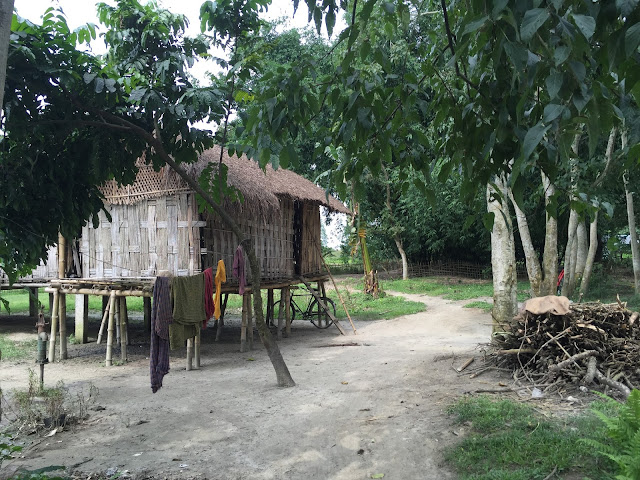Majuli, the river island where my anthropological fieldwork is based, experiences the monsoon every year between June and August. During this time, the river Brahmaputra, which along with its tributaries girdles Majuli, floods the island, turning agricultural lands into lakes, and breaking the large 189-square mile island into smaller islets that are interconnected through a network of waterways. I first read about the floods in the
news articles that populated the internet during the state elections in Assam in early 2016. Images, showing submerged houses and fields, people fleeing on boats or waiting for aid accompanied these news reports. However, when I first mentioned these floods to my interlocutors in Sitadhar Phuk, a village where people of the Mishing tribe live, they painted a very different picture. “We love the rain,” Kamalakant Kaman, a much respected village elder and my primary interlocutor told me. “We love the floods. We just go into our fields to catch fish.” He told me this shortly before the rains began in June 2016. By August 2016 several
images of flooding and displacement once again populated the island. So, this summer, when I visited him, I posed the question once again. “How were the floods last year?” I asked. And to my surprise, he gave me the same response.
A day later, Kamalakant took me to his friend, Horen’s home in the neighborhood. As we drank tea that Horen made in his kitchen, his wife Momi and I had a long chat. I posed the question again, and Momi gave me a similar response. “We Mishing people love the rain,” she said. “We build our homes on stilts as you can see, and the water passes under the floor boards. So long as our animals are secure, we don’t have a problem from the floods.” Later she added, “We hang our clothes out to soak and use the water to wash and clean our homes. And fishing becomes so much easier.”
Caption: A typical Mishing home in Majuli
“I already told her,” Kamalakant said.
This time I was persistent. I told them about the pictures I had seen in the media. Several homes were completely under water, and had to be abandoned. People had become homeless.
“Yes, but is because of the flash floods and the erosion,” Kamalakant said. Then he began to explain that the weather conditions during the monsoon, turned the land in Majuli into flood plains, which filled up with water, allowing people who lived along these areas to fish in these waters during the rainy season. Once the water drained, these areas, rich with silt, would act as fertile grounds to grow rice and other vegetables that the Mishing needed. However, in the last century, and increasingly so in the last forty years, development projects as well as badly planned flood prevention plans had precipitated flash floods which destroyed homes and washed cattle away.
During my stay in Majuli, I visited areas in the South east of the island, where such flash floods had carried away massive areas of land in the year 2000, and caused people living in nearly 15 villages to lose their homes. Currently, these people live on the embankment, and are still waiting for aid. Several of these badly affected people were also from the Mishing tribe.
While explaining the difference between the floods that Sitadhar Phuk, which a short distance from the coast, and these other villages face, Kamalakant outlined to me the lifestyle that the Mishing had adopted to live in these floodplains. Their houses, as Momi had said, were built on stilts, and they always made raised shelters for their livestock and for storing their grains during the monsoon season. The villagers also repaired their boats, re-built their roofs before the rain in preparation for the downpour. The Mishing were therefore well adapted to the floods that the Brahmaputra valley was accustomed to. However, flashfloods resulting from other “unnatural reasons,” as Kamalakant termed the bad flood prevention methods and other development projects which had caused trouble in Majuli, were destructive and hard to adapt to.
This idea that the Mishing could adapt to their “natural” environment had both pros and cons. In conversations with one of the island’s administrative head, whose identity I would like to keep confidential, I discovered that this notion made the troubles faced by the Mishing invisible, or at least less visible, to the state. This assumption that anyone from the indigenous community could adapt to their “natural” surroundings only allowed the administration to look into the problems faced by other communities. There was no distinction in these conversation between the slow floods that allowed the Mishing to fish and silted their lands, and the flashfloods that destroyed the land, eroded entire villages, destroyed homes and displaced people.
As I advance my research, I plan to follow up on this summer’s findings. In the meantime, as I prepare to spend the year in George Washington University, I am also excited to read more about the environmental history of my field site, through accounts written by historians like Arupjyoti Saikia and Gunnel Cederlof, whose books on the topic I bought in Guwahati, the capital of Assam during my archival work there. Both researchers underline how everyday life is built around the capricious environment in the Brahmaputra valley and in the North Eastern states of India at large, and both underline the role of colonial rule in starting development projects that by the looks of it have been unsuccessful until today in controlling the water systems of the region. These histories, and my conversation with my interlocutors in Majuli, leave us with a question: what does living with the environment look, and how do we do this without making anyone’s problem invisible in the eyes of the State?



